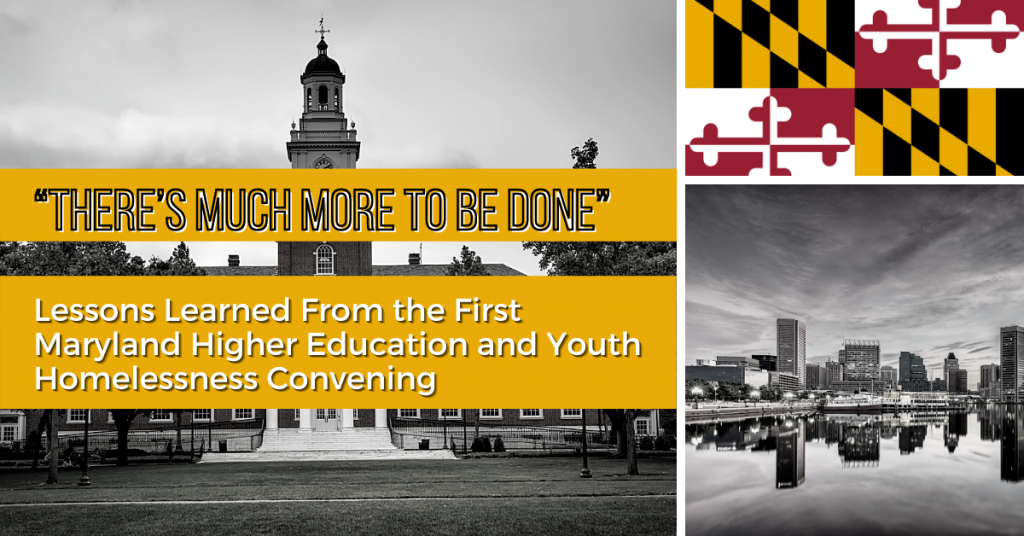 Article published on School House Connection on January 14, 2021.
Article published on School House Connection on January 14, 2021.
“In mid-December, the Coalition to End Youth Homelessness in Maryland and the University of Maryland – College Park’s Fostering Terp Success Program hosted a virtual convening for Maryland higher education institutions and community organizers to discuss new research and best practices for students experiencing homelessness. Over 40 participants from various Maryland higher education institutions joined.
The first speaker was Daejanae Day, a youth advocate and co-chair of the Youth Action Board of SHIP Frederick County. Daejanae shared her personal experience pursuing a higher education while also experiencing homelessness. She had a strong support system of mentors who connected her with resources. For example, Daejanae needed help with her financial aid and tuition fee waiver and was able to reach out to people who helped expedite this process. Daejanae recognizes that while she’s lucky to have these individuals in her life, there are many other students just like her who don’t have any help and COVID has made helping harder. She was happy to share her story and work amongst people who care about addressing youth homelessness in Maryland. Daejanae’s story was the perfect opening to the convening because she reminded practitioners why we do this work and that we have so much more work to do.
We continued to hear student insights conducted from a basic needs student focus group. About 18% of students in the focus group experienced homelessness in the past 12 months, similar to national statistics from The Hope Center. Many of these students also utilized food insecurity resources and public benefits. Most students knew where to go to find these resources, but accessibility and experiences varied greatly. It’s important to provide students with resources that are easily accessible, safe, and not stigmatized.
Next, we turned to what institutions are doing to support youth experiencing homelessness. Jillian Sitjar, Higher Education Program Manager at SHC, shared general best practices from colleges and universities to support students experiencing homelessness. Topics included the transition from high school to college, financial aid, identification, housing support, other resources, and advocacy. Jillian provided institutional examples and COVID considerations and encouraged folks to share what they’re doing at their institutions in the chatbox. To see all of SHC’s higher education best practice tip sheets, see here.
Some Maryland institutions had already been implementing best practices. In Oct. – Nov. 2020 the Coalition to End Youth Homelessness in Maryland conducted a basic needs security survey to Maryland institutions asking, “how do higher education institutions across Maryland address their students’ basic needs?” The survey yielded 17 responses out of 30 public colleges and universities. The survey focused on outreach to students, institutional contacts, basic needs services including food, housing, and financial aid. Only eight institutions responded to the questions about the tuition waiver for unaccompanied homeless youth and foster care. Many institutions were unaware that the tuition waiver exists, which demonstrates the need for more implementation training. Currently, the Homeless Persons Representation Project is working to amend this policy and if you have any questions or would like to get involved, please contact Ingrid Lofgren.
Next, we took a deeper dive on basic needs and youth homelessness at one Maryland institution. The University of Maryland College Park’s Fostering Terp Success program is committed to increasing the academic and personal success of students with experience in foster care, homelessness, and without a supportive family system. They do this by providing housing, food, living essentials, academic supplies, and transportation support. Fostering Terp Success identifies safe and stable housing for students experiencing homelessness to ensure that they’re housed 12 months during. The program utilizes a strengths-based trauma-informed approach when working with students to build connections and community through coaching, workshops, and international outreach with their dedicated newsletter. There are various systems in place to identify students experiencing homelessness, including using the FAFSA, scholarship applications, faculty syllabi, and one-on-one interactions. It’s important that faculty and staff know that Fostering Terps Success exists and can refer students to these resources. The program was awarded a Youth Homelessness Demonstration Program grant from Prince George’s County and the U.S. Department of Housing and Urban Development (HUD), which enables them to hire a full-time case manager to work directly with students experiencing homelessness.
Lastly, we came together as a group to share out on concerns, limitations, and needs of both students and higher education professionals. Common themes of mental health, childcare, and the digital divide were brought up, especially with remote learning. It was encouraging to see so many institutions and individuals engaged in conversation and shows that there is momentum to work and support these students.
We ended the convening knowing that this is the first of many gatherings, and we hope to continue the conversation with more targeted training on the Maryland tuition fee waiver. We provided a Google folder with all the resources shared and a recording of the convening. We’re also excited to share that since the convening, new federal legislation passed that includes significant new financial aid policies, including revisions to the Free Application for Student Financial Aid (FAFSA) for unaccompanied youth experiencing homelessness and former foster youth. To learn more about the new federal law, see here.”